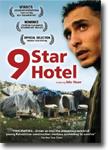 |
|
|||||||||||||||||||||||||||||||||||||||||||||||||||||||||||||
Ido Haar's touching chronicle of Palestinian construction workers who find illegal work in Israel brings to light a tough existence. They build a beautiful city called Modi'in, sneaking over the border and through traffic to get to the job sites. We are invited around their campfires and into their sheds to see how they live and struggle to carve out a meager existence. We run with them from the authorities, hide in the bushes, duck behind the rocks. It's the kind of life difficult to fathom from a comfortable Western point of view. These men are the only breadwinners for their families back in Palestine, and they risk jail to bring a wage home. Ahmed and Muhammad take center frame in this, their tale - partly because they live interesting lives, partly because of their charisma. Ahmed's family wants him to get married, but he's reluctant. After he breaks his leg while running from the authorities, the state-run hospital puts him in a bed and sends him back to Palestine. He'll be back at the camp after he heals. Muhammad is bright, charming and hardworking. He works with plaster on giant condos too expensive for him to live in. He's funny and bright, and we wish he could have it easier. We get to love these people for who they are - people much like ourselves, doing work left undone by Israelis. Seeing this, one can't help but think on our own southern border here in the U.S. Not so different, is it? 9 Star Hotel Director Ido Haar spent a year with Ahmed, Muhammad and all and never spoke fluent Arabic. He'd pick up on words here or there, but much of what was captured on film wasn't realized until the translation process began. |
|
|||||||||||||||||||||||||||||||||||||||||||||||||||||||||||||
|
||||||||||||||||||||||||||||||||||||||||||||||||||||||||||||||
| action | animation | art house/international | comedy | documentary | drama | family | horror/sci-fi | suspense | television | ||||||||||||||||||||||||||||||||||||||||||||||||||||||||||||||
| contact | home | ||||||||||||||||||||||||||||||||||||||||||||||||||||||||||||||


